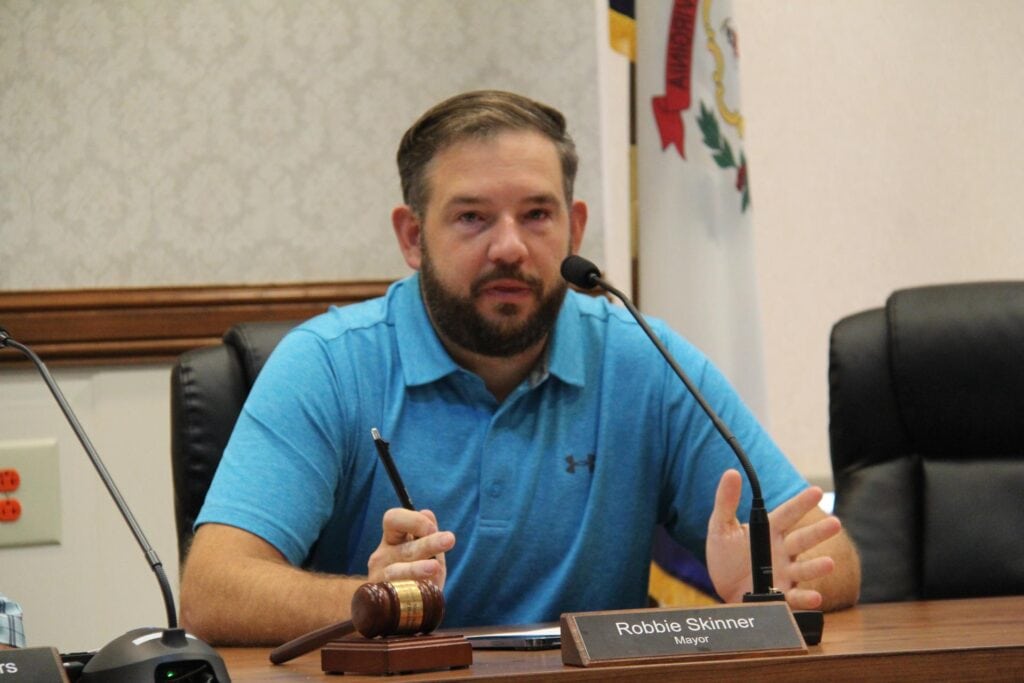TENNERTON – It’s electric!
The first electric battery-powered school bus will be deployed in Upshur County Schools next week as part of a state-backed pilot program involving a partnership with GreenPower Motor Company, which recently acquired a manufacturing plant in South Charleston, West Virginia.
At the Feb. 21 Upshur County Board of Education meeting, Mark Nestlen, vice president of business development with GreenPower Motor Company, briefed board members on the launch of the company’s Nano Beast School bus, which will hit roads within the city of Buckhannon Friday.
Nestlen explained that in January 2022, the company announced it would establish an East Coast manufacturing facility in South Charleston.
“That announcement was made with the state back in last January, and as things progressed through the year, Governor Justice, back in June, decided that he was going to direct us as a company as well as the state through the Department of Education and Department of Economic Development to run a pilot project in the state,” Nestlen told the BOE.
According to a GreenPower Motor press release, GreenPower entered into an agreement with the State of West Virginia to manufacture electric school buses starting in mid-2022. Under the terms of that agreement, the state promised to purchase at least $15 million worth of electric school buses. Upshur County Schools is part of round 4 of the pilot program and will be the third county to utilize the specific Type A electric-powered school bus in the Mountain State.
“So, the school districts across the state of West Virginia have the opportunity to bring the school buses out and see how they perform in the area and really provide data on how these buses perform in places that aren’t 75 degrees, blue skies and sunny every day of the week on flat roads,” Nestlen said. “If it can run in West Virginia, it can run anywhere, right?”
GreenPower Motor Company is testing out two types of school buses: a Type D 40-foot school bus that can accommodate up to 90 passengers and a Type A 25-foot school bus that seats 14. Upshur County is receiving the latter and can use it through April 13.
“You would probably think of it more as maybe an activities bus or special needs bus or something of that nature,” Nestlen said. “That bus has a rear curbside lift at 1,000 pounds, and that bus is set for one wheelchair securement, so it’s a 14-passenger bus with one wheelchair securement; it is an award-winning vehicle.”
The bus is “purpose-built,” which means that the bus was built to run as an electric vehicle.
“It wasn’t a diesel bus that we ripped the guts out of and tried to make it an electric bus,” Nestlen said. “This bus is made from the ground up on a chassis to be an electric vehicle, and it provides a smoother, safer ride for students. This particular Type A bus has run in Clay County, and it’s currently running in Wyoming County. Upshur County will be the third county to use this particular type of bus.”
“I can tell you that when that vehicle was deployed in Clay County back last October, that was the first purpose-built all-electric Type A vehicle to run anywhere in the United States, and it ran first right here in West Virginia,” he added.
Data collected on the electric-powered buses thus far seems promising, Nestlen told the BOE.
“What the pilots have been showing data-wise to this point is that on mountainous terrain, in colder weather, on narrow rural roads, they do exactly what they’re supposed to do,” he said.
The bus can travel between 110 and 150 miles on a full charge.
“Collectively, charged properly during the day and at night on a Level 2 charger, you’re going to get between 200 and 225 – maybe up to 250 miles a day,” Nestlen said. “That’s not on a single 100 percent charge; that’s when you’re charging in the middle of day, and you’re getting a full charge back at night that you get that kind of miles, and that kind of miles is exactly why an electric school bus goes into a school system – because those are the kind of miles you need to run your systems.”
The Nano Beast bus will arrive Monday, Feb. 27, and on Thursday, March 2, GreenPower will host a training for first responders, mechanics and bus drivers. The bus will hit the roads Friday, March 3.
Board member Sherry Dean asked what would happen should the bus break down, and Nestlen said school system mechanics would not only receive training, but mechanics at the GreenPower Motor plant in South Charleston would be on call.
“Your mechanics will have my technicians on speed dial because part of the pilot project is that we’re accessible 24/7 to be here to help you with that,” he said.
Nestlen fielded a few additional questions from board members, saying the battery warranty is eight years. Although replacing batteries for each vehicle today costs $36,000, he anticipates it will be much cheaper in eight years at the end of a battery’s life. The Type A Nano Beast is currently priced at $285,000, with the larger Type D bus running around $375,000.
“The issue of changing your fleets to electric vehicles is your upfront purchase price,” Nestlen said. “Your operating and maintenance costs will be reduced by 70 to 80 percent from your current fleet when you move to electric vehicles. That doesn’t mean that your mechanics are out of a job — they have other things to do – but your fuel, your maintenance and your operation [costs] are down 70 to 80 percent.”
BOE president Dr. Tammy Samples asked finance manager Jeffrey Perkins what a regular diesel-powered 72-passenger school bus costs, and he said approximately $123,000.
According to its website, GreenPower Motor Company designs, builds and distributes an array of all-electric medium and heavy-duty vehicles, including transit buses, school buses, shuttles and cargo vans.













